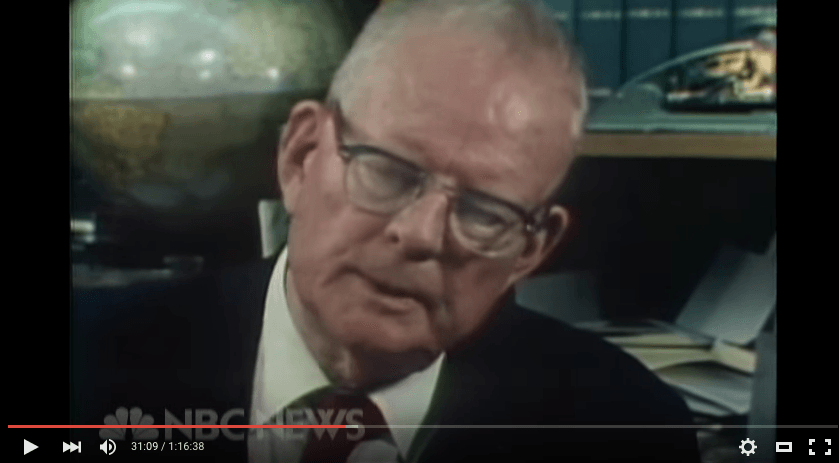Anybody who has studied the work and writings of W. Edwards Deming knows the part of his bio and story that says (per Wikipedia):
“In 1980, he was featured prominently in an NBC TV documentary titled “If Japan can… Why can't we?” about the increasing industrial competition the United States was facing from Japan. As a result of the broadcast, demand for his services increased dramatically, and Deming continued consulting for industry throughout the world until his death at the age of 93.”
I've never been able to see this program. I was six years old at the time and my summertime activities didn't include watching long-form NBC documentaries. The video has never been available online… until now.
 The W. Edwards Deming Institute and Dr. Deming's grandson Kevin Cahill worked with NBC to make the program available, giving the institute perpetual rights to it (see their blog post). To the institute's credit, they've made this freely available on YouTube.
The W. Edwards Deming Institute and Dr. Deming's grandson Kevin Cahill worked with NBC to make the program available, giving the institute perpetual rights to it (see their blog post). To the institute's credit, they've made this freely available on YouTube.
Here is the video, which runs about 76 minutes:
I'll write another blog post (probably multiple blog posts) about the video, its highlights, and my reflections.
There's great interest in this video, gauging from reaction on Twitter and LinkedIn after I shared it there.
I'd encourage you to watch it, not just out of historical curiosity, but to think about how this video and story is relevant today, 35 years later. The main segment on Dr. Deming is Part IV of the program (one hour in), which you can reach via this direct link. Dr. Deming also makes a few brief appearances earlier in the documentary.
A few highlights and images I shared on Twitter:
From the NBC documentary "If Japan Can, Why Can't We?" #Deming pic.twitter.com/pworPHt9ey
— Mark Graban (@MarkGraban) November 21, 2015
From the 1980 NBC documentary that introduced #Deming https://t.co/t1OoDXJdG3 pic.twitter.com/BrcksDe4NM
— Mark Graban (@MarkGraban) November 21, 2015
More posts on the video:
It's Not the Worker's Fault – in 1980 or Today (Part 1 of “If Japan Can, Why Can't We?”)
More Notes on Dr. Deming & “If Japan Can, Why Can't We?” (Part 3)
What do you think? Please post a comment and share the video.
What do you think? Please scroll down (or click) to post a comment. Or please share the post with your thoughts on LinkedIn – and follow me or connect with me there.
Did you like this post? Make sure you don't miss a post or podcast — Subscribe to get notified about posts via email daily or weekly.
Check out my latest book, The Mistakes That Make Us: Cultivating a Culture of Learning and Innovation:










A lot of interesting information. I was curious about how the steel mill focused on the incentives for workers to produce more (the Japanese visitors commented on the plant being the most productive they had seen, according to the manager), but I didn’t hear a lot about the quality of that production. I presume it was high productivity coupled with high quality. For those who feel like we are living in unique times, an objective assessment of the video will show that we face the same challenges now that were faced (and, in some cases, addressed) in the past.
Thanks for the comment, Robert.
There’s much more to blog about… a few things that stood out were the practices highlighted in the video that Dr. Deming quite likely would have criticized strongly.
1) The production quantity-based incentive pay at Nucor… did that have a negative effect on quality or teamwork? Piecework type pay systems often do. Maybe Nucor had a good process that only allowed for (or paid for) the production of high quality steel.
2) The quality posters and slogans at Nashua Corp (which is surprising since Dr. Deming worked directly with them and Bill Conway). I guess the habits of communicating through posters and slogans die hard?
This chart, with a 10-year running average DOES suggest productivity growth bottomed out in 1980 and got better. How much of that was due to information technology, as opposed to employee engagement and management systems? Probably mostly IT?
I would want to do some research on healthcare productivity – depending on how that’s measured?
More than half of the discussion focuses on updating technology and relaxing government regulations as the solution to productivity problems. That still hasn’t changed as most companies are just looking for that ‘magic pill’ of new equipment, software, or other tech to fix all the problems. Also disappointing is the implication that productivity gains can only be made in manufacturing but service industries and government are exempt.
As one relatively short on life experience it’s depressing to see how little the attitude of North American industry has changed since even before I was born.
The hairstyles and technology has changed… but sometimes it seems not much else has.
Bill Conway, CEO of Nashua Corp. said in the video:
“Anyone who doesn’t join that [3rd industrial] revolution [led by Deming] is, I think, over time going to be in serious trouble.”
That didn’t turn out to be true in most industries, did it? Some organizations that didn’t adopt Deming’s ideas are in serious trouble… but many are doing just fine in spite of that.
Deming’s revolution petered out…
I, too, find the comment about Nucor’s incentives interesting. I wonder if they still incentivize this way? If not, why not? If so, are they paying for what should be produced by the “system” anyway? You can’t get 2 gallons of milk from a one gallon jug.
If the system is set up to produce X and you are getting 1.X+ by offering incentives, then it may be that incorrect data may have been used to establish production quotas in the first place. This is no indictment on management or labor, just would like to know more as I’ve seen first hand how incentives KILL quality and morale while driving internal competition.
It sounded like, in the program, that incentive pay was very individualized.
I found this page about Nucor and it sounds more like profit-sharing — total profits divided by number of employees.
Group incentives can be gamed, but it’s less dysfunctional that individual piecework pay?
When I got to visit some distilleries and cooperages (that make barrels) in Scotland, one was on a pure piecework system, where employees were paid by the barrel. They were paid by the GOOD barrel, which was based on a quality control inspector’s assessment. I saw what looked like arguing over the quality level…
The second cooperage paid an hourly rate.
Interesting to see what difference in approach.
I agree with your comment that internal competition can be very dysfunctional and can hurt quality and performance.
Mark, I also found this article on Nucor’s hourly pay system. http://www.businessknowhow.com/manage/nucor.htm
They pay a below average wage with penalties (if you miss a day of work you don’t get your bonus for the week).
A key point of systems thinking is, to quote Deming, “the system is the method by which we produce results.” And, I believe that. If Nucor’s “system” is capable of producing 35-40 tones of steel per hour when a bonus is paid, then why can’t they produce that when a bonus isn’t paid? Nucor leadership knows what the system can produce! So does labor. This is nothing more than shuffling checkers on a board.
On another note, I do believe in sharing “revenue”, but I’ll save that for another discussion!
My friend Dan Markovitz beat me to the punch in blogging about this powerful moment from the video:
“I WANT TO BE A SOMEBODY.”
Yes, the notion of respect for each individual of critically important to Lean and I think Dr. Deming’s influence on Toyota played a part in that.
[…] I shared the famed 1980 NBC documentary, “If Japan Can, Why Can’t We?” that essentially introduced W. Edwards Deming to a mainstream Western business […]
[…] I shared some more notes from Part 3 of the 1980 NBC documentary “If Japan Can, Why Can’t We?” that featured W. Edwards […]
[…] Famed NBC Video with Dr. Deming from 1980 Now Available: “If Japan Can, Why Can’t We?… […]
Mark, Thanks for the comments. I’ve found them helpful. I’m presenting some information to a lean group of history of Lean/Six Sigma. It sounds like Deming’s ideas must have played heavily into Six Sigma. Did Motorola ever have a relationship with Deming? Who, is anyone, is waving the Deming banner and following his teaching in 2016?
Hi Brenda – I’m not sure if Dr. Deming ever worked with Motorola.
Arguably, aspects of Six Sigma are an extension of TQM methods, which were influenced by Deming (although he wasn’t fond of labels like that).
You might want to reach out to the Deming Institute… they can probably provide better answers. And I’ll invite somebody to comment here.
I am not aware that Dr. Deming worked directly with Motorola. I know my father http://williamghunter.net/ worked with them a bit (but don’t believe that work was very extensive). Deming did not speak kindly of “six sigma” or “TQM”… I posted about six sigma and Deming community on the Deming Electronic Network (long deceased) http://management.curiouscatblog.net/2005/08/20/has-six-sigma-been-a-failure/
I do believe six sigma drew from Deming’s ideas but there are weaknesses in that critical parts of the system Deming had in mind are not usually known by those adopting six sigma.
As to Deming today you can get some good sources from The W. Edwards Deming Institute podcasts, blog and YouTube channel (the channel has presentation from their conferences by those applying Deming’s ideas including CEOs and consultants).